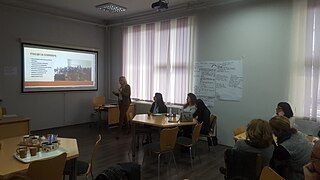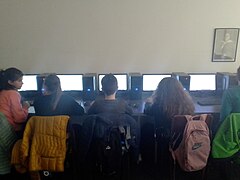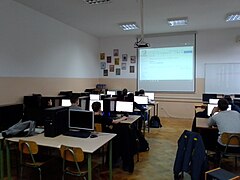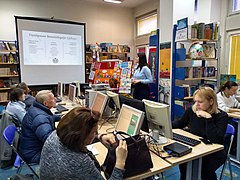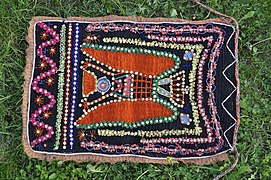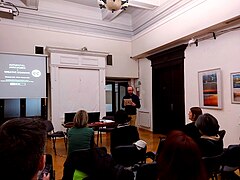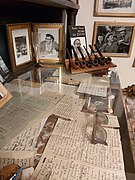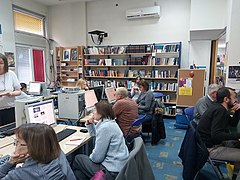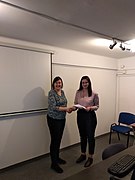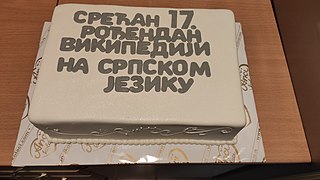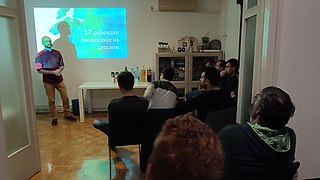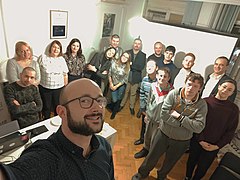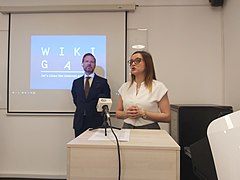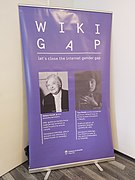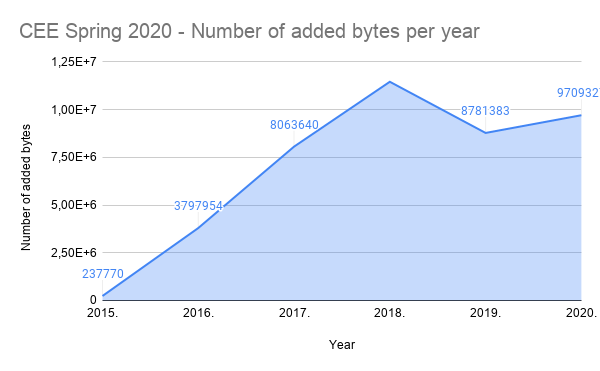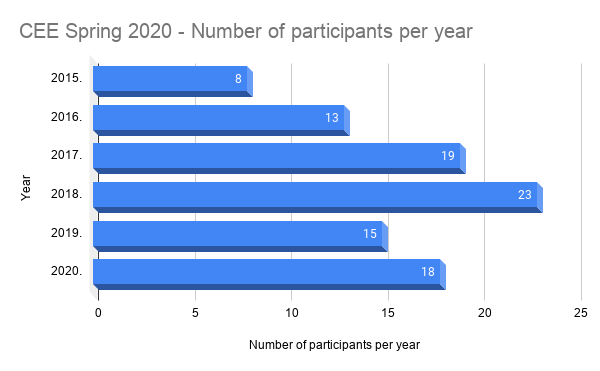Grants:APG/Proposals/2019-2020 round 1/Wikimedia Serbia/Progress report form
Purpose of the report
[edit]This form is for organizations receiving Annual Plan Grants to report on their progress after completing the first 6 months of their grants. The time period covered in this form will be the first 6 months of each grant (e.g. 1 January - 30 June of the current year). This form includes four sections, addressing grant metrics, program stories, financial information, and compliance. Please contact APG/FDC staff if you have questions about this form, or concerns submitting it by the deadline. After submitting the form, organizations will also meet with APG staff to discuss their progress.
Metrics and results overview - all programs
[edit]We are trying to understand the overall outcomes of the work being funded across our grantees' programs. Please use the table below to let us know how your programs contributed to the Grant Metrics. We understand not all Grant or grantee-defined Metrics will be relevant for all programs, so feel free to put "0" where necessary. For each program include the following table and
- Next to each required metric, list the outcome/results achieved for all of your programs included in your proposal.
- Where necessary, explain the context behind your outcome.
- In addition to the Global Metrics as measures of success for your programs, there is another table format in which you may report on any OTHER relevant measures of your programs success
For more information and a sample, see Grant Metrics.
Overall
[edit]| Metric | Achieved outcome | Explanation |
| 1. number of total participants | 1593 | out of 2000 planned for the whole year |
| 2. number of newly registered users | 1234 | out of 1450 planned for the whole year |
| 3. number of content pages created or improved, across all Wikimedia projects | 9363 | out of 15000 planned for the whole year |
| 4. file usage | 1166 | out of 5500 planned for the whole year |
| 5. number of partnerships | 43 | out of 90 planned for the whole year |
Education Program
[edit]| Metric | Achieved outcome | Explanation |
| 1. number of total participants | 1216 | out of 1400 planned for the whole year |
| 2. number of newly registered users | 1200 | out of 1200 planned for the whole year |
| 3. number of content pages created or improved, across all Wikimedia projects | 1813 | out of 1900 planned for the whole year |
| 4. file usage | 134 | out of 300 planned for the whole year |
| 5. number of partnerships | 24 | out of 50 planned for the whole year |
GLAM Program
[edit]| Metric | Achieved outcome | Explanation |
| 1. number of total participants | 140 | out of 250 planned for the whole year |
| 2. number of newly registered users | 17 | out of 70 planned for the whole year |
| 3. number of content pages created or improved, across all Wikimedia projects | 1951 | out of 2600 planned for the whole year |
| 4. file usage | 215 | out of 1160 planned for the whole year |
| 5. number of partnerships | 4 | out of 20 planned for the whole year |
Community Support
[edit]| Metric | Achieved outcome | Explanation |
| 1. number of total participants | 231 | out of 350 planned for the whole year |
| 2. number of newly registered users | 22 | out of 180 planned for the whole year |
| 3. number of content pages created or improved, across all Wikimedia projects | 5547 | out of 10500 planned for the whole year |
| 4. file usage | 804 | out of 4040 planned for the whole year |
| 5. number of partnerships | 14 | out of 20 planned for the whole year |
Telling your program stories - all programs
[edit]Please tell the story of each of your programs included in your proposal. This is your chance to tell your story by using any additional metrics (beyond global metrics) that are relevant to your context, beyond the global metrics above. You should be reporting against the targets you set at the beginning of the year throughout the year. We have provided a template here below for you to report against your targets, but you are welcome to include this information in another way. Also, if you decided not to do a program that was included in your proposal or added a program not in the proposal, please explain this change. More resources for storytelling are at the end of this form. Here are some ways to tell your story.
- We encourage you to share your successes and failures and what you are learning. Please also share why are these successes, failures, or learnings are important in your context. Reference learning patterns or other documentation.
- Make clear connections between your offline activities and online results, as applicable. For example, explain how your education program activities is leading to quality content on Wikipedia.
- We encourage you to tell your story in different ways by using videos, sound files, images (photos and infographics, e.g.), compelling quotes, and by linking directly to work you produce. You may highlight outcomes, learning, or metrics this way.
- We encourage you to continue using dashboards, progress bars, and scorecards that you have used to illustrate your progress in the past, and to report consistently over time.
- You are welcome to use the table below to report on any metrics or measures relevant to your program. These may or may not include the global metrics you put in the overview section above. You can also share your progress in another way if you do not find a table like this useful.
| Target | Last year (if applicable) | Progress (at end of Q2) | Projected (end of year) | Comments |
|---|---|---|---|---|
| Example | Example | Example | Example | Example |
Education Program
[edit]| Wikipedia in schools
Goal: Introducing Wiki-projects to academic circles Description: Students write their papers on Wikipedia or other Wiki projects, and in return receive points within their subject exams in school or university. Accredited seminars Goal: educating teachers to work independently in order to implement Wiki-projects in their institution Description: project involves organization of accredited seminars Application of online wiki tools as a didactic means in teaching throughout Serbia. The seminars are accredited by the Institute for Advancement of Education (State Institute for professional development of the teachers) and teachers gain 8 points for professional development by attending it. These seminars are all-day workshop on how to edit Wikipedia and implement it in class. The seminars are designed exclusively for teachers. Edu Wiki camp Goal: recruit new Wiki ambassadors and education volunteers and strengthen connections between them Description: The purposes of this camp are attracting new Wiki ambassadors, additional training of current ones, as well as strengthening the network of education volunteers. Camp program has many different topics, which involves editing Wikipedia training, manners of cooperation with educational institutions, technical skills regarding realization of Education program etc… |
- Education Program in pictures
-
Accredited Wikipedia course for teachers
-
Workshop at Regional Vocational Training Centre in Knjaževac
-
Wikipedia workshop at primary school "Bora Stanković"
-
WMRS Educational program, Ninth Gymnasium
Outcomes of the realized projects
[edit]Wikipedia in Schools
[edit]The Wikipedia in Schools project, which includes Wiki Scholar, Wiki Student, Wiki Pupil and other activities in educational institutions, involves training elementary, high school and college students to edit Wiki projects and write seminal papers on Wikipedia. Due to the nature of the project, the activities included the first semester of the 2019/2020 school year (January) and the entire second semester of the 2019/20 school year (February - June 2020). In the period from January to June 2020, a total of 46 workshops were held in primary and secondary schools, high schools and faculties. Individual activities that were realized in this period are:
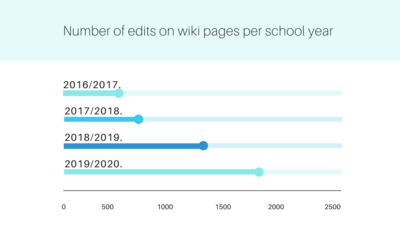
- Introduction of Wikidata at the Faculty of Economics, University of Belgrade, which shows that Wikimedia Serbia is working on spreading this important project into educational institutions.
- A gathering was held in the Regional Center in Knjaževac, which was organized by the Technical School from that city after the successfully completed project "Wiki treasure of my region". The project was realized after two teachers, who participated at the accredited seminar of Wikimedia Serbia in Niš, wanted to join our projects and engage their students in a creative way, by writing articles about their town on Wikipedia. The same project was presented at the online conference "Digital Technologies" during the coronavirus pandemic.
- Wikimedia Serbia promoted the possibility of applying for its grants among secondary and primary school teachers at the State Seminar of the Serbian Mathematical Society, where we wanted to point out the financial assistance we provide to the teachers for their creative Wiki ideas, and thus increase the number of educational institutions that will apply on the call for project proposals.
- Holding online workshops for pupils and students during the state of emergency in Serbia due to the coronavirus pandemic, which shows that we adequately reacted to the situation during which schools and colleges were closed. In cooperation with teachers, we have shown that in the irregular circumstances we can maintain the planned activities and achieve the planned results.
- The first thematic week of improving seminal papers on Serbian Wikipedia was organized in cooperation with the Serbian Wikipedian community. The action was created in order to improve the content in this language version of Wikipedia and to bring the Education Program closer to the members of the community. This meant going through seminal papers that were written poorly, and reducing the number of unverified and unorganized papers written within the Wikimedia Serbia Education Program.
- Cooperation was established with the Public University "Božidar Adžija" in Belgrade, but its implementation was postponed for the second half of the year due to the pandemic. The idea was for the project to involve senior citizens who are interested in new technologies in order to learn how to edit Wikipedia.
- A list of all scientific papers and conferences at which our Education Program is mentioned has been published on the official page of the Education Program on the Wikimedia Serbia website. The list was published in order to achieve a greater academic foundation for our activities and to increase their visibility.
- An agreement was reached with the representatives of GLAM Macedonia on holding a joint camp for high school students. However, this activity was also postponed due to the pandemic of the COVID-19, even though it was supposed to be held in March.
Accredited seminars
[edit]In the first half of the year, two accredited seminars for teachers were held, due to the health situation, the ban on gatherings and the closure of schools. Seminars were held at the Institute for Modern Education in Belgrade and Zikica Damnjanovic High School in Smederevska Palanka. However, Wikimedia Serbia has overcome this with a reliable partnership with the Institute for Modern Education. This cooperation was increased during the pandemic by the organization of the online seminar for teachers. The aim of the seminar was to promote Wikipedia for educational purposes and the concept of online assignments and their evaluation. The seminar was followed by 148 teachers via Institute`s web site. The result of this seminar was cooperation with the elementary school "Vuk Karadzic" from Krusevac.
In addition, Wikimedia Serbia continued to monitor the implementation of the project and to support teachers in order to continue using Wikipedia in teaching. It helped us establish clearer criteria for the target group we want to attend our seminars, primarily, in terms of computer literacy.
Edu Wiki camp
[edit]The planned activities on this project were not realized due to the health situation and the ban on gatherings. However, Wikimedia Serbia came up with the idea to organize an online version of this event in the period October / November 2020, so specific activities for that occasion will be designed and implemented during July and August.
| The internship in Wikimedia Serbia was very intellectually stimulating | “I applied for the internship at Wikimedia Serbia because, though Wikipedia is something I use practically every day (and which is often taken for granted), I realized that I don't know much about how exactly I can contribute to that knowledge base. Given that internship is about writing articles for Wikipedia, I believed that I would be comfortable with a flexible internship time, that it is not an obligation which must fit strictly into the daily schedule, as well as that I could show some of my more specific knowledge that does not fit too well into my academic career. The practice met my expectations, and even exceeded it, because I had full freedom in terms of topics I could write and research about - it was very intellectually stimulating! I got acquainted with the workspace of the site itself and practiced a slightly more encyclopedic style of writing, which I had not had the opportunity to do before. I could ask for help or advice at any time, even if it was about details and little things, everything was well explained and we were clearly focused on how we should work. Circumstances were such that we worked online instead of face-to-face, which is not really an obstacle for performing this specific internship, compared to many others, and the communication by email went without complications.”
|
| Seventh year of cooperation with Wikimedia Serbia and very positive comments from students | “This year, at the School of Electrical and Computer Engineering of Applied Studies in Belgrade, our focus was on writing articles on Wikipedia. Students were creating new articles on their own favorite topics. Contributing to Wikipedia is recognized as a good way to improve students' skills by using new and open learning platforms, which can help students in their future work and understanding of problems in a particular area. The basic idea was for students to understand how to use Wikipedia correctly and how to create articles on it. One of the biggest challenges in the workshops was the fact that some workshops had to be held online. However, that did not stop us from getting extremely positive comments from students for this project, which we are implementing for the seventh year in a row.”
|
Successful stories
[edit]All computer science teachers of the Ninth Gymnasium in Belgrade joined the Wikipedia in schools project
The Ninth Gymnasium in Belgrade is one of the educational institutions with which Wikimedia Serbia has had a long-term cooperation, that is reflected in the fact that computer science teachers are included in the educational program every school year. This school year 2019/2020 is specific because it is the first in which all computer science teachers, six of them, joined the project. Thanks to that, all students of the school went through workshops on editing Wikipedia, which shows that Wikipedia is recognized as an extremely useful tool in teaching. All groups of students wrote articles on personally chosen topics, some edited Wikipedia in code, and others in a visual editor, depending on the curriculum for a particular class. In addition, it should be noted that the teachers agreed to include the same workshops in the curriculum next year, but also Wikidata for the fourth grade.
Wikidata successfully introduced at the Faculty of Economics in Belgrade
During this semester, Wikimedia Serbia focused on greater use of Wikidata in the educational program. A workshop on editing Wikidata was held at the Faculty of Economics, University of Belgrade. Working on them is recognized as a good way to improve students' skills by using new and open learning platforms, which can help students in their future work and understanding problems in a particular area. Specifically, a very important initiative was taken by Djordje Stakic, a teaching assistant at the Faculty of Economics and a member of the Board of Wikimedia Serbia. This partnership has given us mutual benefits - students had more confidence in someone who teaches them at the faculty, and on the other hand, Djordje has experience in working on Wiki projects, so he brought Wikidata closer to students in the right way together with the Wikimedia Serbia educational program manager. The workshop was attended by 30 students who edited 714 items about Serbia. The basic idea was for students to understand what Wikidata is and how pages are created. This example shows that students understood the future of Wikidata and its application in the right way. In addition to editing Wikidata, students also worked on editing articles on Wikipedia.
Challenges and lessons learned
[edit]Regional cooperation as an imperative
During the CEE conference held in Belgrade in 2019, representatives of Wikimedia Serbia and GLAM Macedonia agreed to hold a joint activity in the form of a regional camp for high school students. Talks about that activity continued during the beginning of 2020, when the details were agreed, the camp program was made, the trip plan and the participants were selected. Though everything went according to plan and we reached a final agreement on holding a camp in North Macedonia, we did not manage to realize the idea due to the closing of the borders. However, what we have all learned is that regional cooperation is possible, necessary, and can be implemented on projects that we are already doing. In that sense, this helped us understand that it does not take much for this cooperation to be realized, and that it is necessary to connect more within the region. That is why we did not give up on the idea of realizing the agreed camp at another time, when the conditions for that are met.
Prepare the accredited seminar to enable it in online form
Due to the circumstances caused by the coronavirus pandemic, we were unable to realize accredited seminars in schools. The situation has taught us that it is necessary to prepare as many things as possible for online version. Since our seminars have not had that option so far, we were thinking about applying for it the next time. Getting the accreditation for online seminar will be possible when applying for the new accreditation, which will happen at the end of 2020. In that sense, we are thinking of making a plan and program for its online realization, which will require a slightly different approach from the offline seminar in schools. In that way, we would be prepared for similar situations in the future, if they occur.
GLAM Program
[edit]| Wiki Loves GLAMers
Goal: Achieving cooperation with cultural institutions in order to increase the corpus of free knowledge, to create and improve the access to the cultural and historical heritage on the Internet, i.e. on Wiki projects. Description: Release of materials by the institutions and individuals, digitization of content, organization of edit-a-thons and other similar activities. Wikipedian in residence Goal: Digitization and release of materials, increasing the content of Wikipedia from relevant sources available in the institution, training employees in the cultural institution for independent work on wiki projects. Description: Hiring a Wikipedian in residence for one to two months in one of the GLAM institutions to work on digitizing and uploading material to the Wikimedia commons, increasing the content of Wikipedia from relevant sources available in the institution, training employees to work on wiki platforms, promoting the idea of Wikimedia missions among employees... Edit-a-thons Goal: Increasing the content on Wikipedia on certain topic, in collaboration with culture institutions, which provide quality literature, or sources for creating articles. Description: Joint work of volunteers and GLAM employees who edit articles on Wikipedia on a particular topic within one or more days. Cultural institutions give literature and release materials for the illustration of written and improved articles. Wiki-librarians Goal: The goal is to motivate librarians to become successful editors of Wikipedia, to enable the expansion of a network of libraries and other cultural institutions and their acquaintance with the activities of Wikimedia Serbia, as well as the upload of quality and more informative content on Wikipedia and Wikimedia Commons. Description: Organizing Wikipedia editing workshops designed for librarians who, for a successful course, receive legally required points for advancement in the field of librarianship. |
- GLAM Program in pictures
-
Wikipedia workshop at Belgrade City Library
-
Material from one of the WIR programs
-
Panel discussion "Public domain, open media, open knowledge"
-
The Legacy of Pavle Vuisić
-
The second Workshop 1Lib1Ref 2020
-
1lib1ref
Outcome of the realized projects
[edit]Wiki Loves GLAMers
[edit]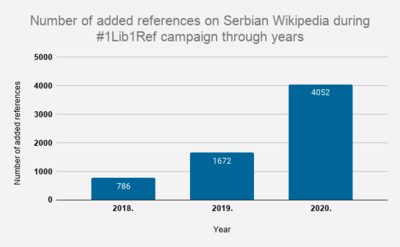
- 1Lib1Ref campaign - Wikimedia Serbia, in cooperation with the University Library „Svetozar Marković” and the Belgrade City Library, started the GLAM year with great success. This time, the global reference editing campaign #1lib1ref placed Serbia among the top wiki communities that entered the largest number of references. A total of 30 participants in this campaign placed the Serbian wiki community in a high second place in the world. In total 4052 references were added into the articles, while the five best campaign editors on the Serbian Wikipedia were placed among the 10 best campaign editors in the world. During the campaign, two Wikipedia editing workshops were held, while the closing ceremony was held at the University Library „Svetozar Marković”. The winner of the campaign was Dr. Milorad Dimić, who also took second place on the world list of editors in the reference-editing.
- Finding GLAMs challenge - For the first time, Wikimedia Serbia participated in the thematic week that includes adding data to Wikidata, and thus began to improve the coverage of information and create the largest global database. Wikimedia Sweden has organized a thematic week to add data on cultural institutions to Wikidata, which is supported by UNESCO. The goal of this thematic week is to improve the data and create the world's largest database of cultural institutions and collections of cultural heritage around the world. Participants contributed to this thematic week with 128,729 entered characters about cultural institutions, 93 improved items, 3 new items and 59 added references to items. The participants have made a big step towards achieving the Wikidata mission and increasing data on cultural institutions on the Internet.
- Panel discussion "Public domain, open media, open knowledge" was held in collaboration with Creative Commons Serbia at the University Library "Svetozar Marković". The focus of this panel was about importance of the public domain in science, education, culture and art. GLAM manager and Education Program Manager presented their programs and work in Wikimedia Serbia as well as the way in which freedom of content is important in the digital world we live in. Representatives of the National Library of Serbia and the University Library "Svetozar Marković” also participated in this panel and share their experience in this field.
Wikipedian in residence
[edit]This year, due to the declaration of the state of emergency because of the COVID-19, the Wikipedian in residence projects started with a delay, while some of them are postponed until further notice. Wikipedian in residence program that is currently in progress:
- National Museum of Toplica - Realization of the project Wikipedian in residence in the National Museum of Toplica is of great importance for us because it contributes to the decentralization of our activities, and at the same time increases free content on Wiki projects on the rich cultural heritage of southern Serbia. So far, 23 articles have been written, 16 articles have been improved, and 266 photos have been added to Wikimedia Commons.
Planned Wikipedian in residence projects:
- Society for Culture, Art and International Cooperation Adligat - The Society for Culture, Arts and International Cooperation Adligat is a new GLAM partner. Within this Society, there is the Lazić Library, the Museum of Books and Travel, the Museum of Serbian Literature and the House of Legacies, which all together contain more than a million books and many rare antiquities. A two-month project has been agreed upon, with the option to extend it to three months due to the abundance of content they are ready to release, for the third quarter of this year.
- Faculty of Philosophy, University of Novi Sad - A Memorandum of Cooperation was signed with the Faculty in the first quarter of this year, when the Wikipedian in residence project was planned to start, however, due to the declaration of the state of emergency due to the coronavirus, the project was postponed until safe conditions are established. The library of the Faculty of Philosophy of the University of Novi Sad, in which the intern will be hired, is the second largest library in the Province of Vojvodina.
- Belgrade City Library - The expansion of cooperation with one of the most important libraries in Serbia, the Belgrade City Library, is planned for the third quarter of this year through the implementation of a Wikipedian in residence project. The Library is ready to release numerous content from its digital library, as well as to provide literature for the uninterrupted work of Wikipedian in residence.
Open call for project proposals of Ministry of Culture and Information - We applied for the open call for project proposals of the Ministry of Culture and Information. This year, financial support was not given, but we received written support for the continuation of the Wikipedian in residence project and confirmation of its importance for digitization and preservation of cultural heritage. The written support of the Ministry is of exceptional importance to us due to the insufficient modernization of the business of cultural institutions in Serbia, and thus the lack of trust in the process of digitization and free content. In this way, we received confirmation of the importance of our projects and thus opened the door to numerous cultural institutions.
Edit-a-thons
[edit]The COVID-19 pandemic, the declaration of the state of emergency in Serbia and a complete change in the way we work have significantly affected the ways of holding edit-a-thons. Until now, this concept has involved editors gathering to write articles, exchange ideas, hold editing Wikipedia workshops, and help each other. Due to the ban on gatherings, one edit-a-thon on the topic of the importance of Serbian literature was postponed until further notice. Our activities, although held online and without physical presence, are still successful and we held an edit-a-thon for International Museum Day, thus breaking the record in articles written during an edit-a-thon on Serbian Wikipedia.
Wiki-librarian
[edit]Wiki-librarian - The ongoing and successful project of the University Library „Svetozar Marković” (UNILIB), received the support of Wikimedia Serbia for the sixth year in a row. The Wiki-librarian is an officially accredited professional development program for librarians. The goal of the project is to inform and train librarians to become successful Wikipedians, as well as to expand the network of libraries and other cultural institutions and to get them acquainted with the activities of Wikimedia Serbia in order to set up rich, high quality and more informative content on Wikipedia. In the first half of the year, one workshop was held at UNILIB, and the other at the Belgrade City Library, in support of the #1Lib1Ref campaign (read more in a separate section below). In addition to the editing workshop, an award ceremony was held for the best editors of the campaign in the UNILIB. Due to the declaration of state of emergency in order to suppress COVID-19 pandemic, all live workshops were prevented, which was previously a large part of the project's activities. Despite that, an online student internship was held with the help of presentations, video tutorials and email support. Wiki-librarians participated in the online Edit-a-thon regarding International Women's Day, the online Edit-a-thon regarding to International Environment Day and in the online Edit-a-thon regarding the International Museum Day.
All GLAM activities are regularly reported to the local and global community through blog posts, a monthly overview of activities that is regularly sent to members of the mailing list and posted on the website, as well as the monthly outreach This month in GLAM. Bearing in mind that this program has achieved great success since the previous publication of our GLAM brochure, we thought it was the right time to publish a new brochure in which we are making the final changes and which will be published soon.
Successful stories
[edit]The first completely online edit-a-thon within the GLAM program was held
Although we are used to meeting, socializing and „face to face” exchanging ideas with other editors of Wiki projects, this year we had to adapt to the new circumstances. Due to the COVID-19 pandemic and urge to prevent further spread of the virus and preserve the health of all of us, we have adapted our programs to online activities. Thus, we replaced the edit-a-thon, which lasted one day and involved live gathering of editors, with a new idea of several days of online editing. The first completely online edit-a-thon within the GLAM program gave great results and we will continue to organize online activities until safe conditions are created for holding offline events.
Organizing the first thematic week that includes Wikidata
The growing use of Wikidata has shown us the significant potential of the platform and its application, so for the first time we got involved in a thematic week that involved working on that platform - FindingGLAMs challenge. The response of editors was relatively modest, but the interest of the editors to participate in this thematic week showed us that we ought to gradually introduce this platform into the program and before organizing a new thematic week make a short guide to using Wikidata and hold editing workshops.
Challenges and lessons learned
[edit]Finding dates to hold online activities
So far, most of our activities have included physical gatherings in order to bring the editors closer which also motivated them to write as many quality articles as possible. As we switched our activities to online events, we extended their duration to encourage editors to participate and thus achieve a successful result. However, as the community of editors is also active in organizing online thematic weeks on Wikipedia, there was a problem of finding a suitable date for holding our activities. In a conversation with the community, we created a page on Wikipedia where we announce our thematic week topics in advance and thus prevent overlapping events.
Delaying and slowing down the realization of activities
The COVID-19 pandemic has affected the postponement of the realization of our activities, to the impossibility of precise planning due to the uncertain epidemiological situation, as well as the postponement of negotiations on the beginning of cooperation with cultural institutions. Thus, the negotiations related to the realization of the project in certain cultural institutions were stopped until the improvement of the epidemiological situation and the creation of safe working conditions.
Community Support
[edit]| WikiLive
Goal: Enabling members of Serbian Wikipedia community to get to know each other, networking and strengthening the connections between them by team problem solving and new project creation. Description: WikiLive is a local annual Wikipedian conference, which is conceived with the idea of strengthening the spirit of the community, interconnecting participants and involving them in the WMRS programs. The conference consists of a two-day program covering various topics from Wikipedia.
Goal: Increasing the motivation and active participation of the community in Wiki projects. Description: Competitions on Wikipedia are organized several times a year. They usually last for a month (except CEE Spring) during which participants write and improve articles on various topics. Members of the jury evaluate the articles, after which winners are proclaimed and rewarded. Contests are a good way to reduce the gap between Wikimedians and Wikipedians.
Goal: Establishing better communication with the community and reducing the gap between Wikipedians and Wikimedians. Description: Within the project, activities such as community gatherings, microgrants, organization of Wiki stand at public events, birthday celebrations, support for individuals in relation to the realization of activities and informing the community about various events through various communication channels are being realized. |
- Community Support in pictures
-
17th Birthday of Serbian Wikipedia
-
17th Birthday of Serbian Wikipedia
-
Wikipedia 19, WMRS celebration
-
WikiGap 2020
-
WikiGap 2020
-
WikiGap 2020
Outcomes of realized projects
[edit]WikiLive
[edit]WikiLive is the annual conference of Wikipedia editors and Wikimedia volunteers. It is usually held in April or May, but it was canceled this year due to the COVID-19 pandemic. Although many things have been prepared (venue, date, volunteers, draft program…), Wikimedia Serbia has decided to postpone the event until further notice due to the health situation. Community safety has always been and will remain our top priority.
CEE Spring 2020
[edit]The competition on Wikipedia in writing articles about the countries of Central and Eastern Europe this year resulted with 571 articles on various topics. Eighteen participants wrote 524 and improved 47 articles. As part of this year's competition, participants contributed with 9,709,327 bytes. The trend of paying more attention to the quality than to the quantity of articles continues.
-
Number of added bytes per year
-
Number of articles per year
-
Number of participants per year
Community Motivation
[edit]Community Motivation includes various activities such as microgrants, meet-ups and gatherings, edit-a-thons, as well as projects of individuals who significantly contribute to Wiki projects.
- Microgrants - the call for microgrants was successfully conducted at the beginning of the year. The decision-making Committee was founded, and the call for project proposals was promoted through various communication channels. In total 13 projects were submitted, and 6 projects were approved, which will be officially included in the project activities of Wikimedia Serbia:
- Wiki Senior was launched in the Belgrade City Library in 2019, as a continuation of the project Belgrade Librarians about Belgrade, with the idea of including people who, by retiring, ended their working life, but still want to be involved in their profession, as well as to continue to actively contribute to the community. In addition to retirees, other interested users and librarians can join the project as well. With this project, Belgrade City Library is involved in the process of spreading free knowledge, as well as in the system of permanent adult education in Serbia. The results were also published on this website epale.ec.europe.eu.
- Tombstones and roadside monuments is a project of Wikimedia Serbia that started in 2017. It refers to the study and promotion of tangible and intangible cultural heritage through recording and photographing roadside monuments and old rural tombstones, posting photographs on the Wikimedia Commons and publishing articles on Wikipedia about them. The project covers a wide range of target groups - from institutions dealing with the study, protection and presentation of cultural heritage (institutes for the protection of cultural monuments, museums), through the general public, to individuals interested in researching genealogical trees or the past.
- Not every crawler is a pest is a project aimed at creating, updating and expanding the existing content on day and night butterflies in Serbia, both on Wikipedia and on Wikimedia Commons, which will complete their life cycle and provide access to comprehensive knowledge about a particular species. Through field research on the outskirts of the city of Nis and the surrounding area, team members with experience in editing articles and volunteers from the Faculty of Science in Nis will collect data and photographs necessary for this task.
- Mountaineers write about mountains is a project with the idea that mountaineers enrich Wikipedia and Wikimedia Commons with their knowledge and information from books, as well as photographs of mountains and everything that exists on them. With the realization of this project, we increase the spread of free knowledge and illustrate articles on Wikipedia in the field of mountaineering and on the topic of mountains and everything natural and anthropogenic that is a part of them.
- The road rarely followed is a project within which members of the Tera Photo Club (part of the Tera Center for Fine and Applied Arts) will photograph settlements in the municipalities of Kikinda, Ada, Kanjiža, Novi Kneževac, Čoka and Senta, which would allow the towns that are scarcely illustrated to be enriched with extremely high quality photographs. The images will also serve to illustrate articles about populated places, cultural heritage, customs related to this region, biographies of people from these places and more. Members of the Tera Photo Club will photograph the buildings of the most important institutions of these towns (school, local community, fire station, etc.), churches, monuments, markets, tourist facilities, birthplaces of famous people.
- Medieval Serbia, Serbia through centuries is a project whose implementation contributes to the collection of free content and its enlargement, as well as increasing the photo material of medieval buildings and structures from our area, which is much less represented than the good coverage of the article from that period on Wikipedia. The idea of the project itself is a tour of primarily fortresses and sacral buildings that were built in that period, and which are in large numbers in our area, where some of them are on the UNESCO list of cultural heritage.
- Projects of individuals who significantly contribute to Wiki projects
- Wikipedia is female - the pandemic is having a big impact on the project. The original idea was to establish cooperation and connections with associations and volunteers through Wikipedia editing workshops, which aim to make notable women visible. Contact was made with organizations that were willing to support the project, including the Swedish Embassy. One of the ideas was that in other cities in Serbia, the guests at the workshops would be famous women about whom the participants would write, and then take photos on the spot. However, that is completely impossible now, as well as further period.
- The cities of Vojvodina - During the first half of the year, preparations were made and connections with relevant institutions and associations that can participate in the project have been established. At the same time, the project was promoted at the Tourism Fair. Over 200 articles have been written and almost 2,000 photos uploaded.
- Wiki Loves Longhorn Beetles - After the project participants went through the training, activities began, among which was training and field education on Fruška gora. Participants later wrote and improved the articles on their own. In total 77 articles were written and 244 photos were uploaded to Wikimedia Commons.
- Thematic weeks on Wikipedia - Thematic weeks are online events with the goal to encourage work on certain topics on Serbian Wikipedia. Although mostly initiated by the community, Wikimedia Serbia supported these actions with blog posts. We also initiated thematic weeks such as improving seminal papers, Finding GLAM, as well the most recent thematic week on the occasion of Danube Day. One of those weeks was also Wiki 4 Human Rights on the topic of human rights, by which Wikimedia Serbia joined the global campaign. During this week, 110 articles were written.
- Edit-a-thons - In the first half of the year, three edit-a-thons were held as part of the Community Support program, two of which were online due to the coronavirus pandemic.
- The edit-a-thon on the occasion of the International Women's Day, i.e WikiGap, was organized, as before, in cooperation with the Swedish Embassy. The intention was to increase the visibility of women on Wikipedia and thus reduce the gender gap that is present on the Internet. The edit-a-thon was supported by the Serbian-Korean Information Access Center and during it 45 articles were written about notable women from various fields. WikiGap aims to strike a balance of gender equality on the Internet. The third WikiGap workshop brought together about twenty editors who were trained by representatives of Wikimedia Serbia to successfully create articles on Wikipedia.
- On the occasion of the World Roma Day, Wikimedia Serbia for the first time organized an edit-a-thon in writing new and improving existing articles on Wikipedia on the topic of identity, history, culture and rights of Roma. The edi-a-thon was an international event and it lasted from April 7 to 12. 50 participants from 19 language versions of Wikipedia joined, and 46 articles were written on Wikipedia in Serbian.
- On the occasion of the International Environment Day, Wikimedia Serbia organized an online edit-a-thon. It started symbolically on Friday, June 5, and lasted throughout the weeke]]nd. During this period, 10 participants wrote 30 articles. With this event, Wikimedia Serbia wants to contribute to raising awareness about the preservation of nature and natural resources.
- Meet-ups and gatherings - During the first half of the year, the celebrations of birthdays of Wikipedia in English and Wikipedia in Serbian were organized, as well as the twenty-third General Assembly. After March, Wikimedia Serbia postponed all gatherings until further notice due to the COVID-19 virus pandemic.
- Data protection - In order to protect individuals regarding the processing of personal data, Wikimedia Serbia has adopted a Rule book on personal data protection. In cooperation with the lawyer, during the first part of the year, activities and control of the application of the adopted Rule book in practice are being adapted. Special focus is given to the protection of personal data of participants at international conferences and events. For the second part of the year, it is planned to adopt the Rule book on work and systematization of jobs, as well as work on giving proposals for amendments to the Statute, in order to improve the clarity and understanding of the text itself.
- Mentorship on Wikipedia - The mentorship program was created by a community development team at the Wikimedia Foundation, all with the goal of better communication among editors, especially those who are taking their first steps on Wikipedia. For that occasion, Wikimedia Serbia has prepared a blog post that will help new editors feel more welcome.
Successful stories
[edit]Wikimedia Serbia is helping the community to promote thematic weeks on Wikipedia
Lately, the communication between Wikimedia Serbia and the Wikipedian community has been much better. Discord helps a lot with that, but also the support of our community in the form of promotion of thematic weeks that are carried out on Wikipedia. Thematic weeks are a way to encourage work in certain areas or topics on Serbian Wikipedia. Some topics on Wikipedia are less represented due to the lack of editors, lack of interest or other reasons. Thematic weeks have been made for bridging those gaps and reaching a certain quality of the content. For now, they are being realized successfully and Wikimedia Serbia is supporting them by increasing the visibility of actions and spreading news about them through standard communication channels.
Challenges and lessons learned
[edit]Adapting activities to the new conditions
The new situation with the coronavirus pandemic has forced us to slow down and adjust our activities. Many activities have been already arranged and planned, such as the WikiLive conference. A lot of time and effort was invested in the organization of not only the conference, but also numerous workshops and events outside Belgrade. This certainly had the impact on the motivation of our volunteers. However, Wikimedia Serbia reacted in a timely manner and organized numerous online thematic weeks in order to animate the community and provide support in difficult times.
Corona virus pandemic and its impact
[edit]The coronavirus pandemic has certainly affected all spheres of life, including the activities of Wikimedia Serbia. Therefore, the organization had to adjust its activities and see how they would be changed. The first step in the reaction regarding the new situation was the cancellation of all in-person activities and gatherings. Project leaders were advised to do the same. Community members then received recommendations from the organization on precautions and advice on how to stay in good health, both mentally and physically. The online activities which they could do were listed. Three online edit-a-thons, two thematic weeks and the CEE Spring competition were organized. The educational program was realized through online trainings, as well as recorded presentations that were sent to teachers and students. In some projects, the activities couldn't be realized, so they were completely changed. Instead of planning a two-day workshop on Avala, the project leader prepared assignments on Wikidata. Volunteers who planned photo tours posted photos they already owned or focused more on the Wikipedia articles. Though health situation affected us a lot, Wikimedia projects are suitable for the online environment and that is a significant advantage in crises like this.
Strategy 2021 - 2023
[edit]In 2020, Wikimedia Serbia is actively working on defining a new strategy and strategic plan, which is why a working group was formed at the beginning of the year. The working group consists of members of the Board, employees and community members, with the aim of gathering more views and creating a more comprehensive strategy. So far, the evaluation of the 2018-2020 strategy has been done, feedback has been received from the community and SWOT and PEST analyzes have been performed. Based on all these results, a draft strategy was created and it will be available to the community for the comments. The final version of the strategy is expected to be published in September. Along with the process, the global process of strategy development is monitored, in order to harmonize the goals. A blog post on strategic recommendations was also translated.
Media
[edit]At the beginning of the year, the news about lifting the ban on Wikipedia in Turkey resounded, which was reported by numerous important media in the country.
The #1Lib1Ref reference campaign was covered by the media this year. GLAM Manager was talking with the media about the campaign, workshops, Wikipedia reliability, etc. with the N1 television, Radio Television of Serbia, Pink TV, Prva TV, Radio B, TV Kopernikus, Radio Beograd 2. The media that also covered the campaign were numerous internet portals.
Numerous internet portals reported about the edit-a-thon for WikiGap campaign on Wikipedia.
The media also followed global developments from the Wiki world, thus reporting on new rules that would reduce potential violence and verbal conflicts on Wikipedia and therefore make it even more accessible and easier to edit.
The internet media reported on the testing of the integration of factual information into the Facebook search and the potential for the introduction of such an option.
Translated report
[edit]This report is available in English and Serbian.
Revenues received during this six-month period
[edit]Please use the exchange rate in your APG proposal.
- Important note
- the anticipated column may list revenues anticipated for the whole year instead of only the 6 months. Please make sure that this the time period clear in the table.
- In the explanation column, always mention relevant information about the numbers: what period they refer to etc.
Table 2 Please report all spending in the currency of your grant unless US$ is requested.
- Please also include any in-kind contributions or resources that you have received in this revenues table. This might include donated office space, services, prizes, food, etc. If you are to provide a monetary equivalent (e.g. $500 for food from Organization X for service Y), please include it in this table. Otherwise, please highlight the contribution, as well as the name of the partner, in the notes section.
Revenue source Currency Anticipated Q1 Q2 Q3 Q4 Cumulative Anticipated ($US)* Cumulative ($US)* Explanation of variances from plan WMF Grant EUR 58,353.46 58,353.46 0.00 58,353.46 63,700.39 63,700.39 Annual Grant - First Installment The Government of the Republic of Serbia EUR 0.00 0.00 3,100.00 3,100.00 0.00 3,384.05 Financial help due to COVID-19 pandemic. TOTAL EUR 58,353.46 58,353.46 3,100.00 61,453.46 63,700.39 67,084.44
* Provide estimates in US Dollars
In-kind donations
[edit]| Donator | In-kind donation | Value (in EUR) |
|---|---|---|
| Heliant d.o.o. | Hosting service | 156.00 |
| Institute for Contemporary Education | Space and refreshment for accredited seminar for teachers | 300.00 |
| Secondary School “Žikica Damnjanović” | Space and catering for accredited seminar for teachers | 350.00 |
| Serbia-Korea Information Access Center | Space for the #WikiGap event (edit-a-thon + cocktail party) | 500.00 |
| Embassy of Sweden in Belgrade | Catering, refreshment and promo-pack for the #WikiGap edit-a-thon | 150.00 |
| TOTAL | 1,456.00 |
Spending during this six-month period
[edit]Please use the exchange rate in your APG proposal.
- Important note
- Budget can be the budget for the whole year (and thus the percentage will reflect the half year and should be around 50%, or the half year, in which case the % should be around 100%. Please make that clear in the table.
- In the explanation column, always mention relevant information about the numbers: what period they refer to.
Table 3 Please report all spending in the currency of your grant unless US$ is requested.
- (The "budgeted" amount is the total planned for the year as submitted in your proposal form or your revised plan, and the "cumulative" column refers to the total spent to date this year. The "percentage spent to date" is the ratio of the cumulative amount spent over the budgeted amount.)
Expense Currency Budgeted Q1 Q2 Q3 Q4 Cumulative Budgeted ($US)* Cumulative ($US)* Percentage spent to date Explanation of variances from plan Office EUR 11,570.00 3,268.31 2,483.73 5,752.04 12,630.16 6,279.10 49.72% Budget for the whole year. Staff EUR 51,216.00 11,867.18 8,684.11 20,551.29 55,908.92 22,434.40 40.13% Budget for the whole year. Services EUR 2,844.00 740.17 563.86 1,304.03 3,104.60 1,423.52 45.85% Budget for the whole year. Contingency and Board budget EUR 2,500.00 565.34 91.73 657.07 2,729.08 717.28 26.28% Budget for the whole year. Participation in Events EUR 4,800.00 0.00 0.00 0.00 5,239.82 0.00 0.00% Budget for the whole year. Education Program EUR 7,470.00 858.39 0.00 858.39 8,154.48 937.04 11.49% Budget for the whole year. GLAM Program EUR 6,950.00 490.91 705.44 1,196.35 7,586.83 1,305.97 17.21% Budget for the whole year. Community Support EUR 12,150.00 2,744.45 853.69 3,598.14 13,263.30 3,927.84 29.61% Budget for the whole year. TOTAL EUR 99,500.00 20,534.75 13,382.56 33,917.31 108,617.19 37,025.15 34.09% Budget for the whole year.
* Provide estimates in US Dollars
Spending of financial help from the Government of the Republic of Serbia (COVID-19)
[edit]Table 3 Please report all spending in the currency of your grant unless US$ is requested.
- (The "budgeted" amount is the total planned for the year as submitted in your proposal form or your revised plan, and the "cumulative" column refers to the total spent to date this year. The "percentage spent to date" is the ratio of the cumulative amount spent over the budgeted amount.)
Expense Currency Budgeted Q1 Q2 Q3 Q4 Cumulative Budgeted ($US)* Cumulative ($US)* Percentage spent to date Explanation of variances from plan TOTAL EUR 3,100.00 - 3,100.00 3,100.00 3,384.05 3,384.05 100.00% By the decision of the Government, this financial aid is paid directly to the bank accounts of the employees.
* Provide estimates in US Dollars
Compliance
[edit]Is your organization compliant with the terms outlined in the grant agreement?
[edit]As required in the grant agreement, please report any deviations from your grant proposal here. Note that, among other things, any changes must be consistent with our WMF mission, must be for charitable purposes as defined in the grant agreement, and must otherwise comply with the grant agreement.
- There were no significant deviations.
Are you in compliance with all applicable laws and regulations as outlined in the grant agreement? Please answer "Yes" or "No".
- Yes.
Are you in compliance with provisions of the United States Internal Revenue Code (“Code”), and with relevant tax laws and regulations restricting the use of the Grant funds as outlined in the grant agreement? Please answer "Yes" or "No".
- Yes.
Signature
[edit]- Once complete, please sign below with the usual four tildes.
- Mickey Mystique (talk) 15:48, 29 July 2020 (UTC)
Resources
[edit]Resources to plan for measurement
[edit]- Global metrics are an important starting point for grantees when it comes to measuring programmatic impact (Learning Patterns and Tutorial) but don’t stop there.
- Logic Models provide a framework for mapping your pathway to impact through the cause and effect chain from inputs to outputs to outcomes. Develop a logic model to map out your theory of change and determine the metrics and measures for your programs.
- Importantly, both qualitative and quantitative measures are important so consider both as you determine measures for your evaluation and be sure to ask the right questions to be sure to capture your program stories.
Resources for storytelling
[edit]- WMF storytelling series and toolkit (DRAFT)
- Online workshop on Storytelling. By Frameworks institute
- The origin of storytelling
- Story frames, with a focus on news-worthiness.
- Reading guide: Storytelling and Social change. By Working Narratives
- The uses of the story.
- Case studies.
- Blog: 3 Tips on telling stories that move people to action. By Paul VanDeCarr (Working Narratives), on Philanthropy.com
- Building bridges using narrative techniques. By Sparknow.net
- Differences between a report and a story
- Question guides and exercises.
- Guide: Tools for Knowledge and Learning. By Overseas Development Institute (UK).
- Developing a strategy
- Collaboration mechanisms
- Knowledge sharing and learning
- Capturing and storing knowledge.


